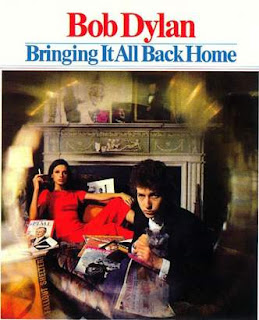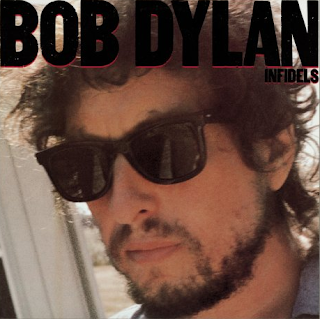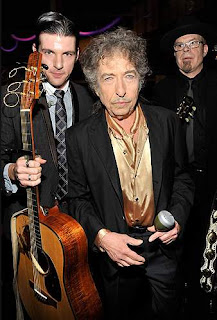
You into thinking you’re the one
That can do what’s never been done
That can win what’s never been won
Meantime life outside goes on
All around you
I know that people are inclined to talk up his more recent work but for me the last great albums were from the 1970s –Blood on the Tracks and Street Legal in particular. There then followed his Christian period and the truly atrocious Slow Train Coming. Dylan was thought to have reached the bottom of the pit when he told his audience in 1980
“I told you ‘The Times They Are A-Changin’ and they did!” he told a crowd in New Mexico. “I said the answer was ‘Blowin’ In The Wind’ and it was! And I’m telling you now, Jesus is coming back, and he is! And there is no other way of salvation.”
In 1971 he had declared, in an interview in Time magazine, that the Neo-Nazi Zionist Rabbi Meir Kahane, was ‘”a really sincere guy. He’s really put it all together.’ One can only assume that it is Dylan’s ignorance and political idiocy which prevented him from understanding that the very segregation he once opposed was at the heart of Kahane’s philosopy, and worse.
Today Dylan is ploughing the same furrow that has guided his career – a love of the money that he lyrically disdains. It should therefore come as no surprise that he is playing in Israel on June 20th. An Israel which maintains a brutal occupation in the West Bank, bombs and murders in Gaza and which treats its Arab citizens in the same way as South Africa treated Black people under Apartheid. But no doubt the money is good. The fact that at 70 years of age Dylan is already fabulously rich and shows no signs of wishing to spend his fortune in retirement, one can only assume that it is a love of money for its own sake that is his guiding principle.
As to whether or not to try and dissuade him from going I disagree with Lenni Brenner. Of course Dylan will no more listen to the voices of Boycott than he did to those who asked him to speak out against the Vietnam War. But the call for Dylan not to go to Israel is aimed primarily at those who still fondly imagine that the Dylan of 1963 bears any resemblance to the old man of today.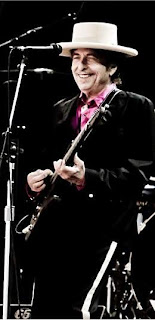
The words of one of his most underrated songs, Masters of War, come to mind when one thinks of Dylan taking blood-soaked shekels whilst he fawns in front of an almost completely Jewish audience.
Is your money that good
Will it buy you forgiveness
Do you think that it could
I think you will find
When your death takes its toll
All the money you made
Will never buy back your soul
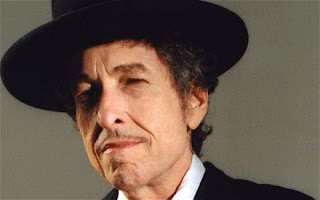 Has-Been Bob Dylan’s May 24 Birthday
Has-Been Bob Dylan’s May 24 BirthdayHi folks,
I recently received a request from an Irish anti-Zionist to try to get Bob Dylan to cancel his upcoming June 20 engagement in Israel. Below are my answer to the Irish comrade and an article I wrote in 2003 on how I triggered off Bob’s song writing career in 1961. The Dylan of that era was a genius, but today he’s such an obvious intellectual has-been that his playing in Israel in 2011 will end up being an embarrassment for Zionism.
*********************************************
Hi comrade,
There are two reasons why people shouldn’t waste their time trying to get Dylan to boycott Israel.
1 – He’d play in Hell if he could make money at it.
2 – All intelligent Americans, Jew or gentile, see today’s Dylan as a crackpot.
Below is an article I published in 2003 in CounterPunch re me and Bob. I ended it by declaring that
“His radical songs will live on. But “do a good deed and throw it into the sea.” His later theological trapeze act, swinging between Jesus and the late Lubavicher rebbe, Menachem Schneerson, can only be described as the all-time-most-pathetic American Jewish tragi-comedy shtik.”
Bob was born into a Jewish family, but the Bob I met in 1961 had become an atheist lefty who went on to write the political anthems of that age. Then he became a Jesus-freak and, later yet, he topped that folly by reconverting to Orthodox Judaism. And within Orthodoxy he hangs in with the Lubavicher sub-sect, whose followers believe that Schneerson was the messiah, who will – any minute now – rise out of his coffin and save his followers.
Let me put this in its real world sociological context. Orthodoxy is Israel’s official religion. But no more than 10% of America’s Jews are Orthodox. Every day, Orthodox males say, as part of their morning prayer, “Thank you God for making me a man, not a woman.”
About 40% of American Jews belong to either the Conservative or Reform Jewish sects. They have dropped that male chauvinist manure and now have women rabbis and gay rabbis. The other 50% have completely abandoned any type of Judaism.
So now we have a unique situation. Bob is one of the most famous people on the planet. But his fame is due to songs he wrote in his leftist period. When he got into Christianity he discredited himself intellectually with 99% of Jews, from Orthodox to atheist. We may disagree on everything else, but we all believe that Christianity is a fairy-tale, and that any Jew who converts to any form of it is sick in the head. The result is that when he got involved with the Lubavichers, most Jews didn’t cheer, not even most Orthodox, except for the Lubavichers, who are ridiculed even by most Orthodox. We all saw his reconversion as another chapter in his mad autobiography.
Since all of this is from a Jewish perspective, it may be hard for Irish folks to understand. So let me give you an Irish analogy. Imagine if Bob O’Dylan was born into a Catholic family. Then he became an atheist leftist and a great songwriter. Then O’Dylan joined Paisley’s Protestant church. Later he reconverted to Catholicism, studied hard and became a priest. Who on the Island – atheist, Catholic or Protestant – would respect Father O’Dylan?
American Jews have the highest income and education of any ethnic or religious stratum in the U.S. That means that they are the most travelled. But the Israeli government admits that more adult American Jews go to Britain than Israel. So I suggest that you just ignore his Tel Aviv gig, or else play with it. Something like
‘Only American Jewish fools like Bob Dylan go to Israel. Educated Jews go to Shakespeare’s home town. So what is the new Dublin government doing to get them to come to the land of Joyce and Yeats?’
Stay well, give ’em hell, Lenni
*************************************************************
I don’t say I was Bob Dylan’s room-mate. Calling some-one your room-mate means that at least one of us paid rent. It was the winter of 1961. I was crashing at banjo-picker Paul Shoenwetter’s pad on East 4th Street between Avenue C and D, in what is now called the East Village, but which we knew as the Lower East Side, along with Vince Hickey, a jazz drummer, and Tom Condit, a socialist buddy, when St. Paul brought in yet another stray.
Vince married black, to the daughter of Victoria Spivey, an ol’ timey blues singer. He was an encyclopedia on ragtime. Tom and I were up to our asses in the civil rights struggle. Bob, at 19, going on 20, 4 years younger than me, was our junior colleague. He couldn’t be expected to say much that was new or interesting or amusing to us worldlings. However we recognized a marvelous musician, and welcomed him into our fraternity of the rebellious, brilliant and crazy.
The highpoint of one chat is chiseled into stone. Peyote was still legal. The problem was that it tasted like tiger piss going down. Then it upsets your stomach. But that’s the best news it ever had. That means the veggie was kickin’ in. It gave me spectacular eyes-closed color visions and the tummy-ache vanished.
Tom processed some. He ground-up a batch of dried up fist-sized buds, and put the powder into gelatin caps. That solves the taste problem. He laid 50 caps on me and split. I took 30 and was waiting for them to come on, when Bob walked in. I gave him the 20. He downed them, told of a near-by party and left. After my technicolor show came on, I walked over.
I vote the winter of 1961 as New York’s greatest. Four fulsome blizzards had left huge mounds everywhere, and then, on Friday night-Saturday morning, February 3-4, another storm dumped 17.4 inches on the city. The total accumulation was the greatest ever. For the first time, the mayor had to ban non-essential traffic so plows could clear a lane down the side streets, with many parked cars buried for months under humongous glaciers. For me, high, those streets, with icicles as big as they get, hanging off tenement fire-escapes, were the once-in-eternity Siberia-in-the-Apple, well past any piddling prophet’s paltry Paradise.
The party was at the home of Village Voice cartoonist Jules Feiffer. Bob was adding whiskey to the peyote, as he, Mark Spoelstra and other folkies played in a back room.
After dawn on Sunday, the 5th, I left for Paul’s. I was alone when Bob came in, 20 minutes later. We chatted about the night, and I got on him about a southern song they sang, Just lookin’ for a Home. “Bob, you never saw a boll weevil. Mark never did. None of us have. If one flew in the window, or crawled in under the door, or whatever the hell they do, we wouldn’t recognize it. Stop singing about boll weevils and sing about your own life and times.”
He was slouched on a couch. In a hot second he was upright, his smiling young face suddenly electrically alive: “That’s what Joe Williams told me!” His new maturing face mirrored his thinking as the implications of what we said sank in. Others have that experience. Someone tells us something but it doesn’t click until someone else slams it in.
It is idle to speculate as to whether Bob could have eventually figured out by himself that he had to do his own thing. I say with certainty that Big Joe and I were, in life, the agencies that propelled him to his destiny. I remember nary another word. But his expressions were unforgettable. Here was the most gifted young musician-poet of his time and place suddenly getting his act together as an adult and performer.
For at least the first minute, almost two, after his exclamation, his thoughts put themselves spontaneously onto his face. His initial reception of my statement was followed by a series of self-induced facial shocks as he silently cooked our old/new ideas in his pot. Then he regained his composure, leaned towards me with his elbows on his thighs and we talked for a few more minutes. Then, as we had been up for a heap of hours, we crashed. There was no doubt that both of us thought a profound thing had happened to him.
Of course I had no idea that he would make such an impact on the world. But that visual scene was hardly one that anyone could forget, even if it happened with a nobody. To be sure, it wasn’t quite as if the scales immediately fell from his eyes and he received sight forthwith and arose and was baptized, as with Saul becoming Paul. But thru his cogitations he did spring up and go. The few words remembered and circa 10 minutes forgotten are how the mind sometimes turns events into memory. A highlight stands in for a whole conversation. The physical details are so vivid because the night was so spectacular and my vision was keyed up by peyote.
As his career took off shortly after, in the full bloom of our friendship, I had further reason to think about that morning, and lock in the incident. I’m sure that he saw it the same way. For the next two years, I was his wise buddy, who pulled his coat on a crux matter for him as a poet and person. In any case, we got up in the Winter dark. We had no food. Bob cleared out first, saying “I have to do some writing.” Yea verily, a bright young fellow came into that pad, a full man went out.
I never asked him what Big Joe actually said. But we get the spirit of it in Robert Shelton’s No Direction Home. Williams’ recalled that “Bob…wrote me thanking me for the advice I had given him about music. What he earned, what he done, he got it honest. They ask me: ‘Is he real?’ And I tell them that they should let him live his own life.”
Being in on the pad’s chats, he understood my “sing about your own life and times” to be more ideologically loaded than Williams’ “live his own life.” I was also able to musically critique him because I had heard many of the best folksingers of the day and had listened to thousands of folk songs on records. In that period, Dave Van Ronk introduced me to Allen Lomax, the great field-collector. After listening to them, I read Lomax on the complex stylistic evolution of American folk music. It was obvious to me that what we call the folk music tradition was actually innumerable singers doing the old songs and making up new ones about their lives and times.
The ideological level varied from none to highly political. It is a myth that folk singers were all poor and illiterate or nearly so. And some were musically highly cultured via their churches. Accordingly, Bob welded our notions together because I added the obligation that his art should reflect our times – his, Mark’s, mine – its experiences and demands, to Williams’ down-home blues sagacity.
Yet note again how the kingly power, chance, plays with us. If I had to be ahead of time to drink with Woody, I had to be the 2nd to hit Bob like the sun, moon and stars falling on him. We ran into each other over the next two years, at Gerde’s Folk City and other hangouts, notably Dave and Terri Thal’s crib. Terri was Bob’s first manager. They were fellow Trotskyists. Bob was there, sometime after his return from his 1962 trip to Europe. Boll weevil Bob told me how he didn’t like to work in clubs for pay because “the people I want to play for can’t afford the admission.”
He ground on, all about how his record company took advantage of his youth to screw him financially, and how he had to make bootleg British records as Blind Boy Grunt. Management atrocity tales were boring old news to a seasoned red, so I tried to get him off himself. “That’s very deep Bob.” He shot back: “How deep is deep? Forty inches? Six feet?” With him completely wrapped up in his career, my like-it-is sarcasm zipped over his self-centered head. But his verbal facility was evident even in that answer that ain’t an answer.
I bumped into him on 6th Avenue and Waverly in the Village in the Spring of 1963. I offered to pay the bill for a coffee. I explained that I had sold a silver goblet boosted from a Reformed Jewish Temple. He smiled and we went to what was then a plain American greasy spoon, now the Waverly Restaurant, got us a table and enjoyed the fruits of what we knew was a crime.
My ex-Christian ex-gal had taken me to a Village Episcopal church. After the ceremony, I went up to the alter and did for to partake of my first communion, without benefit of clergy. I took a wafer from a vessel. Yea, verily, Jerusalem Slim’s body is like unto a Napoleon pastry. So, in return for certainty on a subtle point of Christian ritual that had perplexed Jewish minds for centuries, I led her thru the open doors of an empty sanctum we happened upon in those innocent, pre-crime wave days, down the aisle and onto the raised rabbi’s platform. The ritual goblet held some of what looked like wine, except that it didn’t smell of alcohol. Coke, in a sacred vessel before an altar, is, by American law, a religion, to be protected from desecration. Good. Even great. I’m describing a legal transgression that doesn’t merit repetition. But, in the real American 20th century, that Temple wasn’t Judaism. And in the 21st century Reform ain’t even religion. Its what a minority of Jewish kids grow up doing if they live in our secular Coke present, but are hung up on their parents’ ancestral religion. A book of proverbial truths, spiritual fantasies and barbaric war stories, also reduced, in the physical world, from the perpetual miracle of intoxicating wine, down to flat soda, in an empty shrine.
Bob approved of the double miracle, the conversion of a profaned vessel into capitalist lucre, and then into coffee and snacks, because he also had a contemptuous familiarity with Reform’s instant platitudes.
I don’t remember every word that passed between us. I told him I was heading back to the Bay Area and its politics. After maybe an hour, he felt “a song coming on.” “You know I love to hear you say that.” I left my buddy, pen in hand.
Shortly after I took off for Berkeley. We’ve had no contact since. If history records me, it will be as a historian and political activist. Beyond that, my advice to Bob that winter morning will be seen as my proudest artistic contribution. His radical songs will live on. But “do a good deed and throw it into the sea.” His later theological trapeze act, swinging between Jesus and the late Lubavicher rebbe, Menachem Schneerson, can only be described as the all-time-most-pathetic American Jewish tragi-comedy shtik.
Lenni Brenner, editor of 51 Documents: Zionist Collaboration with the Nazis, can be reached at [email protected]
Sunday, September 25, 2005
What! Bob Dylan? Bob Dylan write a racist song? The Bob Dylan who wrote ‘The Lonesome Death of Hattie Carroll’ and ‘Hurricane’ and all those other great songs about racism and injustice? Surely not!
But I’m afraid it’s true. And I think it says a great deal about the complacent and unquestioning culture in which we live that Bob Dylan’s racist song has attracted no serious attention at all.
Even a smart Marxist Dylanologist like Mike Marqusee loses all sense of critical perspective in the face of the song. But the far-right fanatics and sectarian bigots who benefit from the song know its worth to them and proudly celebrate its propaganda value, as you can see if you check out the website which displays the lyrics.
‘Neighborhood Bully’ appeared on the 1983 album Infidels and is generally passed over by commentators as musically a poor song from a disappointing album. In the best of all the Dylan biographies (Down the Highway: The Life of Bob Dylan), Howard Sounes simply remarks that “ ‘Neighborhood Bully’ seemed to support Israel in its battles with its Arab neighbours.” In his book Chimes of Freedom, Mike Marqusee says that the song is about the 1981 Israeli bombing of the Iraqi nuclear reactor at Osirak.
In fact only the third and fourth lines of the fourth stanza are. Since ‘Neighborhood Bully’ consists of eleven five-line stanzas that leaves 53 lines, which are NOT about Osirak. I would argue that what the song is really about is this.
The third stanza identifies the Jews as a people who for centuries have been oppressed and driven into exile, the victim of prejudice and religious persecution. All the other stanzas are much more specific in their focus, and describe Israel. Israel is personified as a man who is abused as a bully but who bravely fights back against his enemies. Alone in a hostile world, this solitary yet heroic individual is mercilessly persecuted. Friendless, he lives just to survive.
It’s not hard to see why the lyrics are an artistic failure. The personification of Israel as a male fighter doesn’t work because he’s a cartoon figure. A fighter who can defeat a million enemies clearly isn’t in the real world but exists in the realm of fantasy or folk tale. The fighter’s enemies and critics are vague and ill-defined.
But ‘Neighborhood Bully’ is much more than just a song in praise of Israel in its conflict with other Arab states. It is, in every aspect, quite specifically a Zionist song. It contains a number of assertions which lie at the heart of Zionist mythology. Israel, the song asserts, is the innocent victim of irrational and vicious persecution. Israel struggles just to survive in a hostile world. Israel has made a garden of paradise in the desert sand. It took crumbs and made wealth. Israelis have no place else to go. They are unfairly accused of being on their neighbour’s land. Israel fights alone, struggling just to exist, using obsolete weapons, with no allies.
‘Neighborhood Bully‘ evades the core issue of the conflict, which is the ethnic cleansing of Palestinians from their homes and the fifty year history of Israel’s ferociously violent suppression of any form of Palestinian identity or statehood. The dream of right-wing Zionism is to expel all Palestinians from Israel and create a pure Jewish Greater Israel; in that sense Dylan’s song formally enacts that aspiration, as imaginatively it liquidates the Palestinians. They simply have no existence in the song. As a Zionist song, it erases their tangible, historical existence.
As a reproduction of the Zionist master narrative ‘Neighborhood Bully’ is a song crammed with demonstrable historical lies, which it is worth identifying and rebutting. Its most blatantly dishonest line is at the start of stanza six: ‘He got no allies to really speak of.’ But of course Israel, notoriously, is financed, armed and protected by the world’s only superpower, the U.S.A. It is supported at every level – financial, military, diplomatic and ideological. Historically, the success of the Zionist project has always depended on the support of the most powerful and reactionary forces in the world– originally Britain, latterly the U.S.A, and even, in 1948, Stalin’s Soviet Union.
Dylan asserts that hostility to Israel is utterly irrational, and says it’s as if Israel was guilty of doing something as fantastic as change the course of rivers. Ironically, this is precisely what Israel has done. Arab citizens of Israel have been expelled from their villages to clear the way for water diversion projects. This happened to some 3-5000 Arabs in 1951. Five years later, in classic ethnic cleansing, they were forced out of their new homes, over the border into Syria. Today, Israel controls all water resources in the Palestinian Occupied Territories. The average Israeli consumes 350 litres of water per day, but the average Palestinian is permitted only 50 to 70 litres. In refugee camps Palestinians sometimes only manage to obtain 19 litres of water per day. Nearby stand illegal Israeli settlements to which water resources are diverted and used for gardens and swimming pools.
The occupation also serves to negate countless other Palestinian rights. In the Oslo period alone, when Israel was supposedly negotiating to end the occupation, 35,000 acres of Palestinian land was stolen for Israeli settlements. During the first year of the first largely non-violent Intifada 500,000 Palestinian fruit trees were uprooted by settlers and soldiers.
What has attracted no comment at all is Dylan’s language in this song. He says that ‘every maniac’ is given ‘a license to kill’ Israel. These maniacs form ‘a lynch mob’. In other words, opponents of Israel are violent, prejudiced and irrational. But lynching, historically, is a form of sectarian violence associated with white American racists. It is a curious sleight of hand that makes Arabs equal to white American racists, especially when those Arabs are resisting Israelis, some of whom are white American racists. As a defence of ethnic cleansing ‘Neighborhood Bully’ is truly remarkable, as it turns truth and justice on its head. What’s more historically the violence and terrorism of Zionism has always greatly exceeded the retaliatory violence and terrorism of its victims.
As for prejudice: religious discrimination is institutionalised in Israel. It is a state which privileges Jews, with a wide range of discriminatory practises against non-Jews. Bob Dylan has the “right” as an American Jew to buy a home in Israel; a Palestinian refugee, whose home still stands inside Israel, neither has the right to reclaim property stolen by Jewish terrorists, nor even has the right to return to his homeland. In a powerful echo of apartheid South Africa, Palestinians who marry Israelis are not permitted to live in Israel. How apt that the artwork for the Infidels album shows Bob Dylan on a hill outside Jerusalem, exercising his sectarian privileges.
Finally, in claiming that opponents of Israel are “maniacs” Dylan dehumanizes them. He doesn’t engage with critics of Israel; he simply hurls abuse.
It gets worse. In the penultimate stanza, Dylan asserts that the enemies of Israel wait “like a dog waits to feed”. They are now not maniacs but dogs. This is the language of the racist and, historically, the language of Zionism. Noam Chomsky, for example, has noted how the Israeli Chief of Staff Rafael Eitan referred to Arabs as “roaches”; how on one occasion Palestinian prisoners were made “to crawl on all fours and bark like dogs”; how Israeli guards told Palestinians “You are a nation of monkeys”; how Gideon Hausner, prosecutor of Adolf Eichman and chairman of the Yad Vashem Holocuast Memorial Center, referred to the Palestine Liberation Oraganisation as “the centre of a cancerous growth which has metastized all over the world”; how one Israeli Defence Force officer remarked of Palestinians: “There are two alternatives, to live with them or to destroy them. Personally I hate them. They stink. They do not share our culture. They sleep with goats. It is necessary to vaporize them, to turn them to a gas.” Moshe Dayan, the Israeli military leader, suggested that Palestinians be told that “we have no solution, and you shall continue to live like dogs, and whoever prefers – may leave…” (Noam Chomsky, Fateful Triangle, Pluto Press, Updated edition 1999, pp.130, 240, 254, 354, 481)
Finally, no Dylan commentator has ever considered the context of ‘Neighborhood Bully’, which was recorded in New York in the spring of 1983. This was a time when Israel’s standing was at a very low ebb internationally after its invasion and occupation of the Lebanon. This was a very strange time to be asserting that Israel was a victim and releasing what is essentially a crude musical rant in defence of Zionism.
Fortunately Zionism was an allegiance that Bob Dylan maintained only very briefly in his music. But ultimately I think this song stains Dylan’s oeuvre in much the same way that anti-Semitism stains the achievement of T S Eliot, but in a way that is worse. Eliot’s anti-Semitism pre-dated the Holocaust. It was the kind of sniffy anti-Semitism which was very common among the English upper classes of the period, and also among many English novelists who were not conservatives like Eliot (there are derogatory references to Jews, for example, in the fiction of Graham Greene and Patrick Hamilton). But none of those writers, as far as I’m aware, produced malign representations of Jews after Auschwitz. Whereas the music of ‘Neighborhood Bully’ muffles the recent screams, and the memory, and the continuing unfulfilled need for justice of the victims of this.
Bob Dylan intended his song title ‘Neighborhood Bully’ to be ironic. But the irony was subtler and sharper than he intended. ‘Bully’ originally meant ‘hired ruffian’ and that is precisely what Israel today is – the local thug hired by the biggest world bully of them all.
